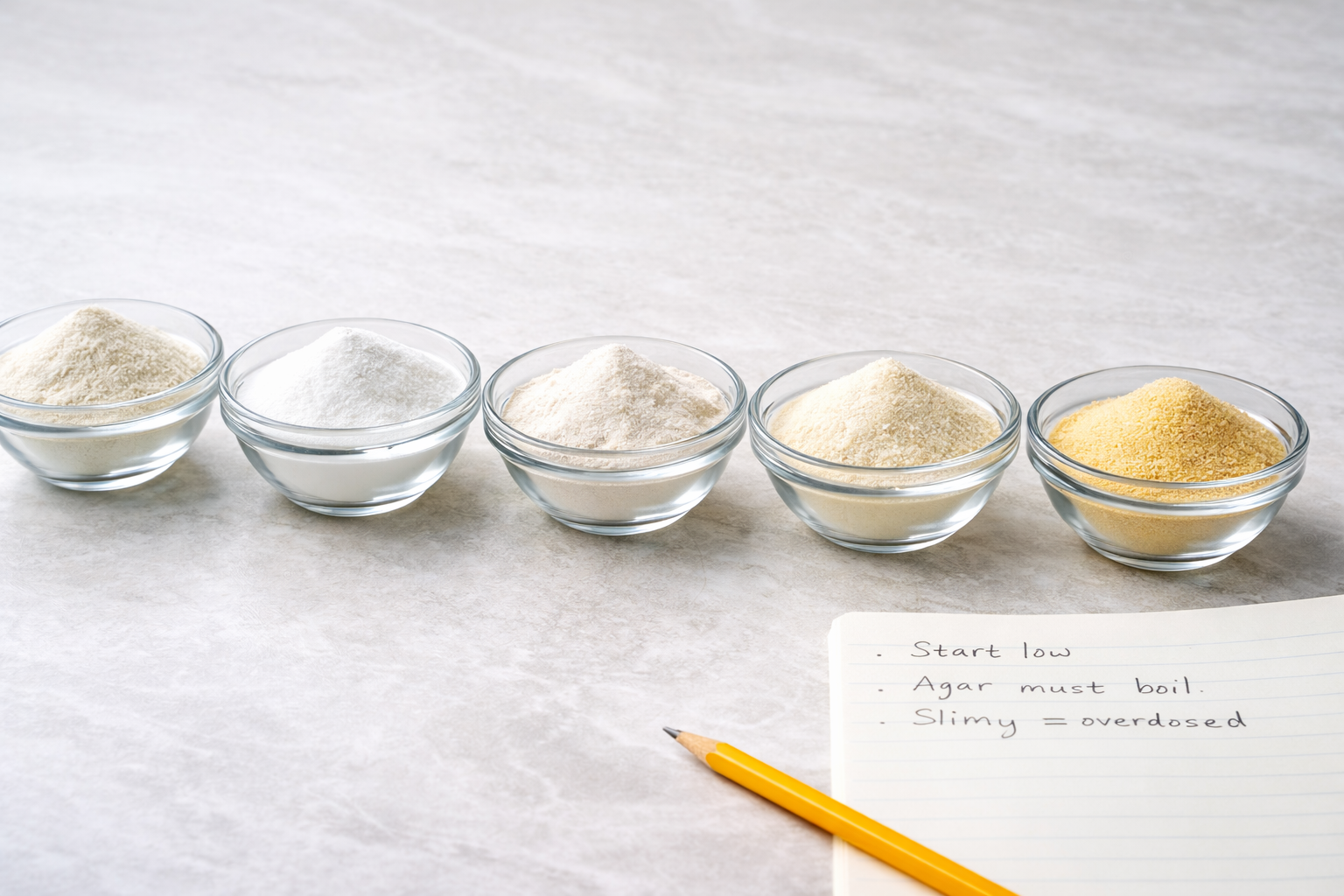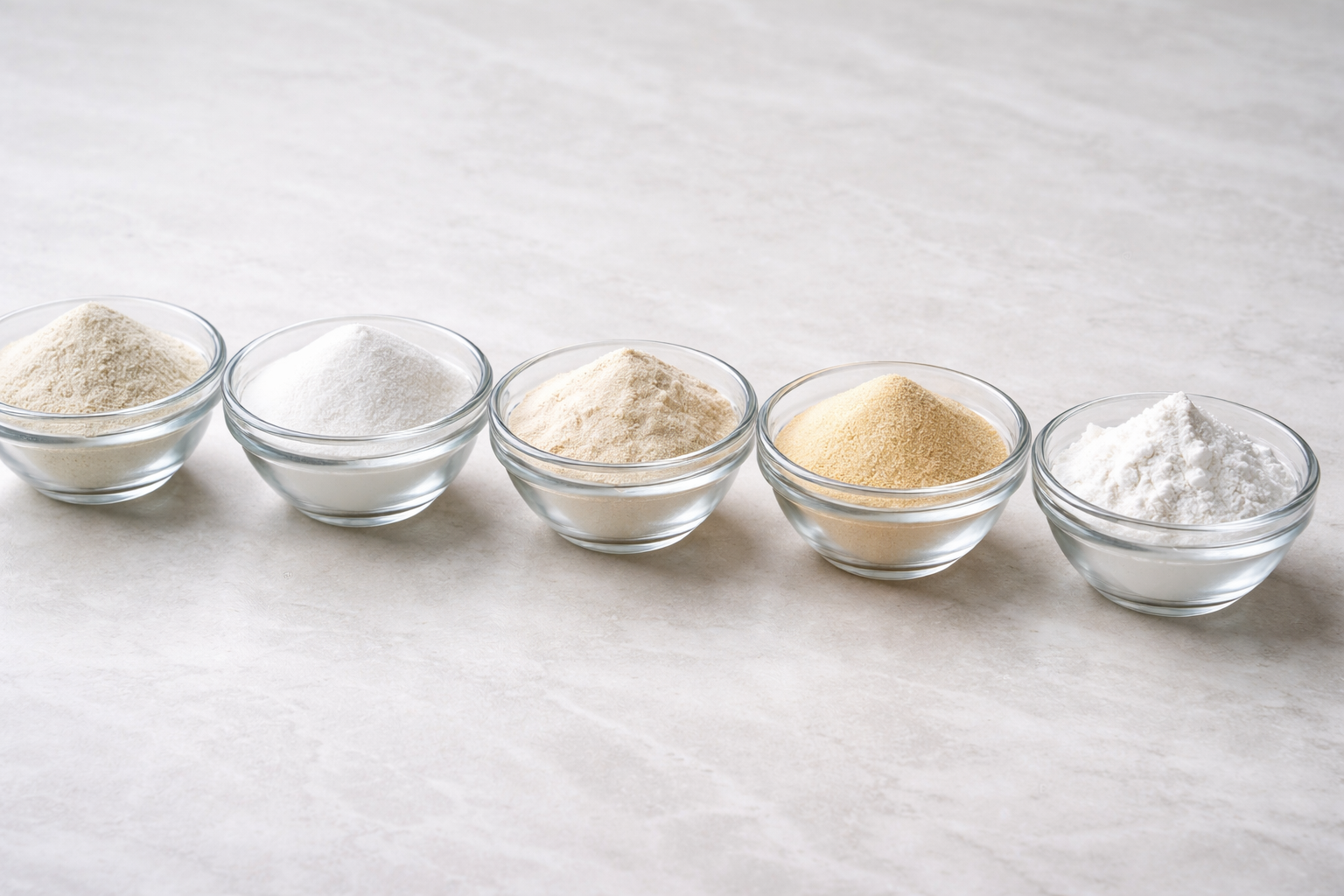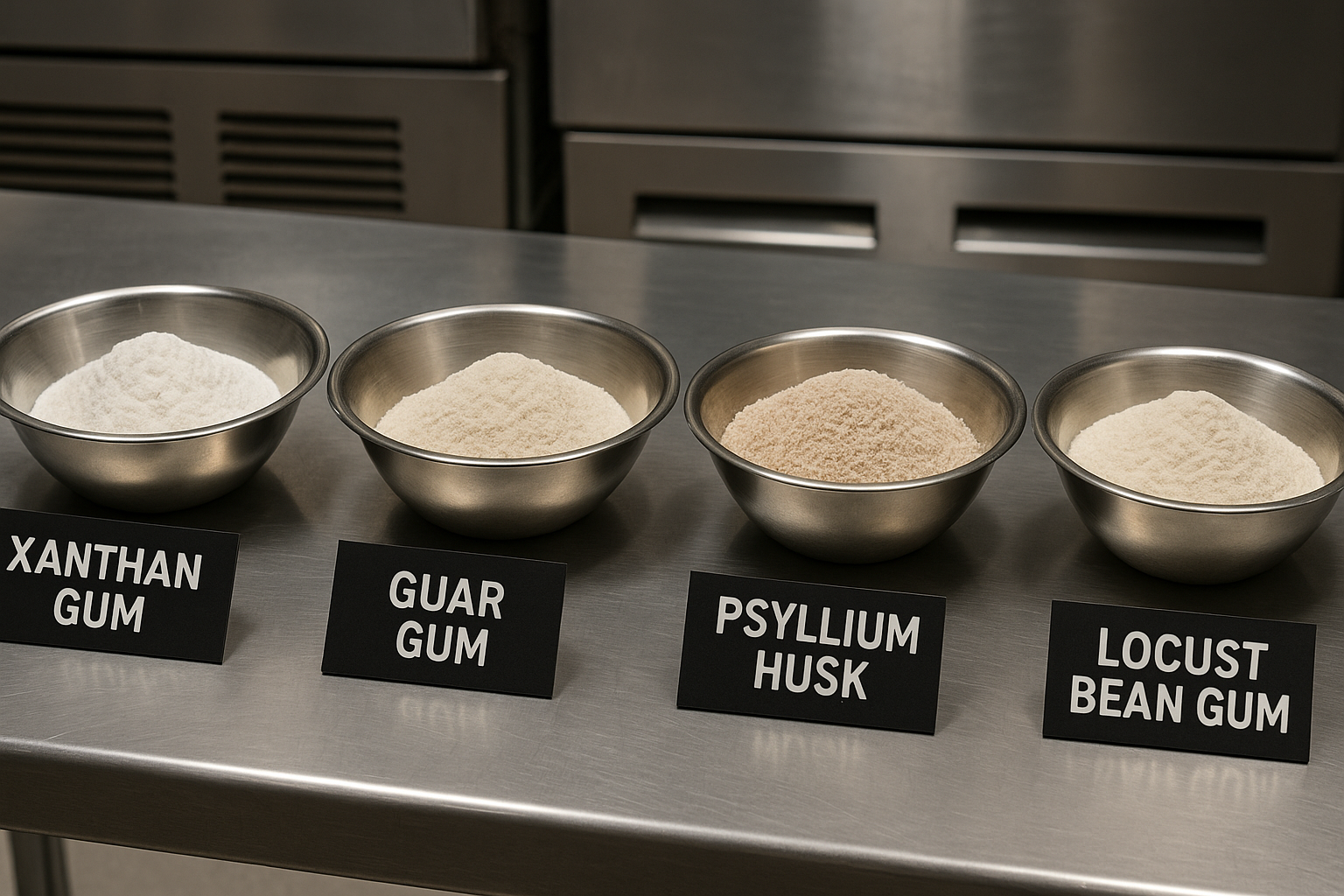
Sodium Alginate Uses in Food + Best Substitutes & Alternatives
SUBSCRIBE TO OUR BLOG
Promotions, new products, and recipes.
Updated February 16, 2026
If you’re looking for a quick answer: sodium alginate is most commonly used for spherification, thickening sauces, and forming heat-stable gels in modern cooking.
Sodium Alginate Uses in Food
Sodium alginate holds many types of food systems based on their concentration, preparation and calcium availability.
Spherification (Molecular Gastronomy)
This is the most familiar application. When sodium alginate solution combines with calcium (calcium chloride or calcium lactate), a thin gel membrane instantly develops around the liquid. This allows chefs to create:
Fruit caviar
Cocktail pearls
Encapsulated sauces
Flavor spheres
Liquid-filled “yolks”
Two primary methods exist:
Basic spherification: Sodium alginate in flavored liquid, poured into the calcium bath.
Reverse spherification: Calcium in flavored liquid, dropped into alginate bath.
For liquid-core spheres, sodium alginate has no direct substitution. You can explore a detailed guide on the backbone of spherification for a deeper explanation of this process.
Thickening Cold Systems
Sodium alginate hydrates in cold water and increases viscosity without the use of heat. This makes it valuable in:
Cold sauces
Smoothies
Salad dressings
Fruit purees
Beverage stabilization
Unlike starch, it does not need to be cooked. Contrary to xanthan gum, it can be arranged later with calcium if it is desired.
Frozen Desserts and Ice Cream
Sodium alginate acts as a stabilizer in frozen systems. Benefits include:
Reduction of ice crystal growth
Improved creaminess
Better freeze-thaw stability
Enhanced mouthfeel
Controlled meltdown
It is often used in combination with other hydrocolloids for multi-layered texture systems to be developed. You can compare stabilizer behavior inside the Hydrocolloid Resources Hub.
Beverage Stabilization
Sodium alginate can suspend particles and reduce the chance for suspension of any other substances and separation in beverages. It works well in:
Acidic fruit drinks
Smoothie systems
Functional beverages
Fortified drinks
It thrives in acidic environments better than many starches, so it remains stable in systems with low pH. In some applications, buffering with sodium citrate can help control acidity before gel formation.
Encapsulation and Controlled Release
Sodium alginate is calcium-reactive and suitable for encapsulating:
Probiotics
Vitamins
Flavor oils
Nutraceutical ingredients
Encapsulation can shield delicate ingredients from oxygen, light and stomach acid and permits a controlled release. For additional encapsulation strategies, see Introduction to Alginate-Based Food Encapsulation.
Vegan Gelling Applications
Sodium alginate provides plant-based gel functionality. Compared to gelatin:
It is vegan
It does not melt easily
It can be heat-stable
It functions without animal proteins
For product development from plant based, it is a useful structural tool.
How Sodium Alginate Powder Does Its Job
The mechanism elucidated enhances performance.
Step 1: Hydration
With regards to Sodium Alginate Powder Distributed In Water:
The powder particles are filled with water
The long chains swell
Viscosity increases
A uniform hydrocolloid solution forms
Proper dispersion is vital to avoid clumping.
Best practice:
Sprinkle slowly into agitated liquid
If possible, use high-shear blending
Allow 20–30 minutes of hydration
Remove entrapped air
Step 2: Calcium Crosslinking
So, when calcium ions are introduced:
Calcium replaces sodium ions
Alginate chains bind together
A gel network forms
Structure becomes permanent
The gel strength depends on the following:
Calcium concentration
G/M ratio of alginate
Temperature
pH
Concentration of alginate
It is this calcium dependent mechanism that differentiates sodium alginate from thickeners.
Sodium Alginate Replacement: What Is It?
There is no substitute which could be made universally effective. The right substitute will be what works best for your needs.
Are you trying to thicken?
Form a gel?
Create spheres?
Stabilize dairy?
Each alternative works differently. Each alternative works differently. For a broader overview of sodium alginate uses, review how functionality changes across applications.
Comparison of Sodium Alginate and Popular Substitutes
Ingredient — Thickening — Forms Gel — Calcium Reactive — Vegan — Best For
Sodium Alginate — Yes — Yes — Yes — Yes — Spherification, stabilization
Agar Agar — Slight — Strong — No — Yes — Firm gels
Gelatin — Slight — Soft — No — No — Soft elastic gels
Xanthan Gum — Strong — No — No — Yes — Thickening
Pectin — Moderate — Yes — Sometimes — Yes — Fruit gels
Cornstarch — Strong (heated) — No — No — Yes — Basic thickening
When to Use Each Substitute
Use agar if you need a strong gel with sliced shape that doesn't distort.
If you have a soft, elastic melt-in-mouth texture, you'll want gelatin.
For pure thickening without gel structure, choose xanthan gum.
Use pectin for fruit-based jams and high sugar systems.
Utilize cornstarch for basic cooked sauces.
If your application relies on calcium crosslinking or liquid-core spheres, sodium alginate has no proper replacement.
A Sodium Alginate Replacement During Spherification
Liquid-core spherification has no substitute.
Agar and gellan can form gels, but not hollow spheres containing liquid inside. Some methods apply reverse spherification with calcium salts, but alginate maintains structural integrity.
If successful in liquid encapsulation, food-grade sodium alginate is needed.
Sodium Alginate vs Xanthan Gum
These are often confused.
Feature — Sodium Alginate — Xanthan Gum
Thickens — Yes — Yes
Forms Gel — Yes (with calcium) — No
Creates Spheres — Yes — No
Heat Required — No — No
Vegan — Yes — Yes
Xanthan gum increases the viscosity. Sodium alginate adds structure when calcium is mixed in. They carry distinct functions.
Performance in Acidic Systems
Sodium alginate is well suited for moderately acidic compositions.
However:
Gel strength can be decreased by very low pH
High calcium increases gel production
Texture is affected by sugar concentration
Having the formulation variables improves reliability.
Is Sodium Alginate Safe?
Yes. Sodium alginate is:
GRAS (Generally Recognized as Safe) - FDA approved
Approved for food use globally
Non-toxic
Plant-derived
Sodium alginate is listed by the U.S. Food and Drug Administration as a permitted direct food additive under 21 CFR § 184.1724, and is classified as Generally Recognized as Safe (GRAS). You can review the official FDA listing here:
FDA Code of Federal Regulations – Sodium Alginate (21 CFR 184.1724)
Research has also examined alginates in gastrointestinal applications. Studies indexed in PubMed discuss alginate’s role in digestive health and reflux management due to its gel-forming behavior in acidic environments. For example, clinical research on alginate-based formulations for reflux support can be reviewed here:
PubMed – Alginate-based formulations in gastroesophageal reflux management
It is also used in:
Pharmaceutical formulations
Dental impression materials
Medical dressings
As is the case with any fiber-rich ingredient, excessive consumption may cause mild digestive discomfort in susceptible individuals. At typical food-levels, it is safe.
How to Get Sodium Alginate Powder
For food uses for sodium alginate for food items:
Use food-grade quality
Check the transparency of the manufacturer
Not to use unvalidated bulk sources
Store in airtight container
Keep in cool, dry conditions
Quality differences affect:
Hydration behavior
Gel strength
Clarity
Consistency
Standard alginate can deliver predictable results. Reliable performance begins with properly manufactured sodium alginate powder.
Storage & Shelf Life
Sodium alginate powder:
Should be kept dry
Is hygroscopic (absorbs moisture)
When sealed has long shelf life
Becomes degraded if exposed to humidity
Packaging should be tightly resealed with protection after use.
Selecting the Appropriate Thickener for Your Purposes
If your goal is:
Smooth thickening → Xanthan gum
Firm gel → Agar
Soft gel → Gelatin
Fruit gel → Pectin
Liquid-core spheres → Sodium alginate
Frozen dessert stabilization → blend with sodium alginate
It's function that counts for something more than ingredient familiarity.
The Importance of Sodium Alginate
Sodium alginate occupies a unique spot amongst hydrocolloids because it:
Works cold
Reacts with calcium
Forms structured gels
Enables encapsulation
Supports vegan formulation
Stabilizes acidic systems
Improves frozen texture
Not many ingredients have all of these properties simultaneously.
Conclusion
Sodium alginate is one of the most versatile hydrocolloids in modern food formulation. It gives:
Cold thickening
Stabilization
Encapsulation
Calcium-reactive gel formation
Vegan functionality
There are alternatives for the basic thickening and typical forming of the gel but no complete replacement for calcium gelation and spherification.
Sodium alginate is still essential for complex texture control, beverage stabilization, frozen dessert systems and molecular gastronomy.
FAQs
What are we supposed to use sodium alginate for?
Sodium alginate is for thickening liquids, stabilization of frozen systems, producing gels and enabling spherification.
What is the replacement for sodium alginate?
Agar, gelatin, xanthan gum or pectin may work depending on the application, but none are able to replicate calcium-reactive gelation exactly.
Can you replace sodium alginate with xanthan gum?
Only for thickening. Xanthan gum cannot create calcium induced gels.
Is sodium alginate vegan?
Yes. It comes from brown seaweed.
Is sodium alginate safe?
Yes. It is FDA-recognized as safe for food use.

|
About the Author Ed is the founder of Cape Crystal Brands, editor of the Beginner’s Guide to Hydrocolloids, and a passionate advocate for making food science accessible to all. Discover premium ingredients, expert resources, and free formulation tools at capecrystalbrands.com/tools. — Ed |
Enjoyed this post? Subscribe to The Crystal Scoop
Food-science tips, ingredient know-how, and recipes. No spam—unsubscribe anytime.
- Choosing a selection results in a full page refresh.



